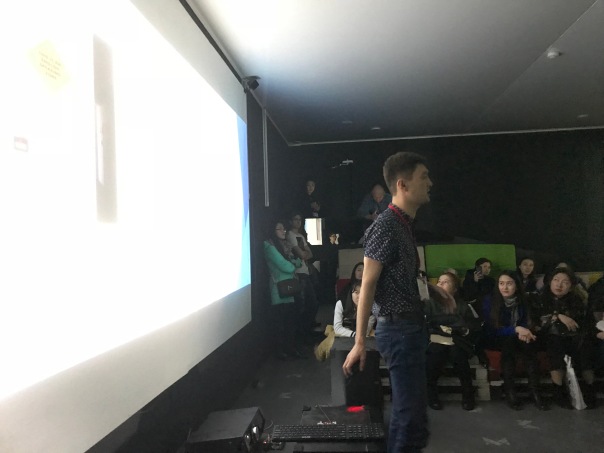I could not quite relate to TED videos on youtube. This time I was looking at things from the perspective of a speaker; both the stage and the people felt odd, at least at first.
Oh, I talked at the 2018 KazTEA PST Conference about Translanguaging in Pedagogy, a topic my groupmates know I am so keen on.

The STAGE and I
I should mention that one of the venues of the event was at Miras University, a private university in Shymkent. The stage they provided was a tad bit different from those you would see in TED talks. It did not fully meet the expectations of the speakers (including me): it was poorly equipped, it was dark and it was literally near the main entrance. You could imagine some people were entering or leaving the hall as I tried to concentrate on the audience. At first, it was disturbing, but a few minutes into my speech the bypassers and all the extra sounds stopped bothering me. I imagine it was partly due to how absorbed I was into the topic. Maybe, on top of that, it is also because I have learnt to focus on my task even in rooms full of people and noise (Shoutout to my ex-roommates!).

The PEOPLE and I
Although I was afraid the listeners would also be distracted, they were surprisingly glued to my slides and me. Perhaps, the exaggerated intonation and non-verbal cues aided me in drawing their attention. Some still must have felt exhausted after the first day of the conference. It was past 5 pm. A handful of attendees leaned back on cosy sofas and seemed motionless. To try and awaken them, I started walking back and forth asking some questions and projecting my voice in their direction. Understanding that the longer the speech is, the less the audience is interested, I decided to touch upon the essence of the topic only. The decision was also based on the contingent of participants: students and school teachers comprised the majority. I guessed not many of them were familiar with research on multilingualism. Earlier the same day, observing the peers I went to seminars and demonstrations with, I made some changes to my PowerPoint presentation and notes. Owing to that, when I used simple language and relatable examples in my speech, the expressions on the faces spoke volumes. Most nodded in agreement and smiled as their everyday practices were addressed. At that point, I realized how crucial it is to put yourself in the shoes of the crowd to perform better.
Through this experience, I shared knowledge and I learned. I learned to command the stage. I learned to orchestrate seemingly minute details to deliver a speech. A speech that resonates with the spectators. Now, reflecting on the TEDx talk I recall the “Improvise. Adapt. Overcome” meme, which accurately describes what I attempted to do. I advise you to be ready to do so, too.
